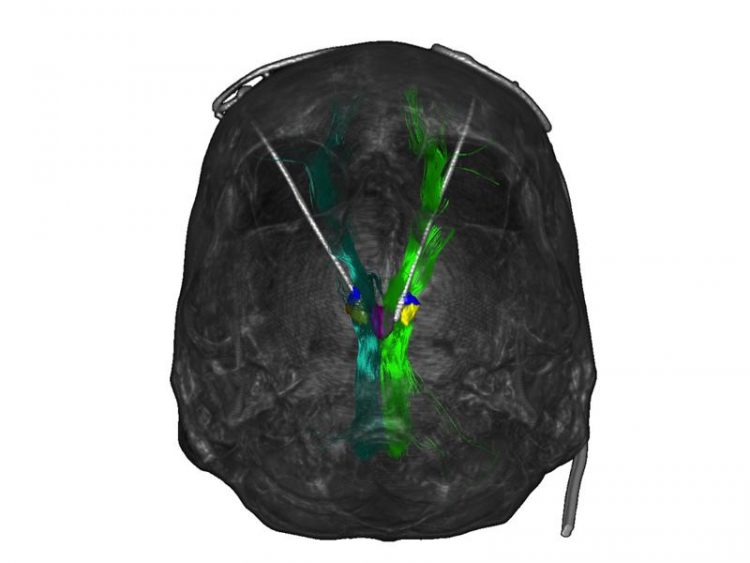Deep Brain Stimulation Provides Long-Term Relief from Severe Depressions

With electrodes, the Freiburg doctors stimulated a brain region that is involved in the perception of pleasure. It relieved symptoms of the depression in six of the eight patients. Medical Center – University of Freiburg
The study was published in the journal Brain Stimulation on 1 March 2017.
“Most of the patients respond to the therapy. The remarkable thing is that the effect is also lasting. Other forms of therapy often lose their effectiveness in the course of time. This makes deep brain stimulation a highly promising approach for people with previously non-treatable depression,” says principal investigator Prof. Dr. Thomas Schläpfer, head of the Interventional Biological Psychiatry Unit at the Department of Psychiatry and Psychotherapy of the Medical Center – University of Freiburg. Deep brain stimulation is a method based on mild electric impulses that can be used to influence selected brain regions with great precision.
Stimulation Takes Effect from the First Month On
The eight test subjects had suffered continuously for three to eleven years from a severe depression that responded neither to drugs nor to psychotherapy or treatments like electroconvulsive therapy. The doctors implanted razor-thin electrodes and stimulated a brain region that is involved in the perception of pleasure and is thus also important for motivation and quality of life.
The doctors evaluated the effect of the therapy each month with the help of the established Montgomery–Asberg Rating Scale (MARDS). The patients’ average MARDS score fell from 30 points to 12 points already in the first month and even dropped slightly further by the end of the study. Four patients achieved a MARDS score of less then 10 points, the threshold for diagnosis of depression.
Some of the patients suffered briefly from blurred or double vision. “We managed to alleviate the side effects by reducing the intensity of the stimulation, without diminishing the antidepressant effect of the therapy,” says Prof. Dr. Volker A. Coenen, head of the Stereotactic and Functional Neurosurgery Unit at the Department of Neurosurgery of the Medical Center – University of Freiburg. The doctors did not observe personality changes, thought disorders, or other side effects in any of the patients.
Larger Follow-Up Study Aims at Registration of Therapy in Europe
If a further five-year study with 50 patients currently underway at the Medical Center – University of Freiburg confirms the effectiveness and safety of the therapy, Prof. Coenen sees the possibility of registering the therapy in Europe. This would allow the therapy to be used outside of studies: “In a few years, deep brain stimulation of this kind could be an effective treatment option for patients with severe depressions,” says Prof. Coenen.
Original title of the study: Deep Brain Stimulation to the Medial Forebrain Bundle for Depression- Long-term Outcomes and a Novel Data Analysis Strategy
Doi: 10.1016/j.brs.2017.01.581
Contact:
Thomas Schläpfer
Head of the Interventional Biological Psychiatry Unit
Department of Psychiatry and Psychotherapy
Medical Center – University of Freiburg
Phone: +49 (0)761 270-68820 or (0)761 270-50210
thomas.schlaepfer@uniklinik-freiburg.de
Johannes Faber
Referent für Presse- und Öffentlichkeitsarbeit
Unternehmenskommunikation
Universitätsklinikum Freiburg
Telefon: 0761 270-84610
johannes.faber@uniklinik-freiburg.de
http://www.sciencedirect.com/science/article/pii/S1935861X17306034 Link to the Study
https://www.uniklinik-freiburg.de/psych.html Department for Psychatry and Psychotherapy
https://www.uniklinik-freiburg.de/neurochirurgie.html Department for Neurosurgery
Media Contact
All latest news from the category: Life Sciences and Chemistry
Articles and reports from the Life Sciences and chemistry area deal with applied and basic research into modern biology, chemistry and human medicine.
Valuable information can be found on a range of life sciences fields including bacteriology, biochemistry, bionics, bioinformatics, biophysics, biotechnology, genetics, geobotany, human biology, marine biology, microbiology, molecular biology, cellular biology, zoology, bioinorganic chemistry, microchemistry and environmental chemistry.
Newest articles

Webb captures top of iconic horsehead nebula in unprecedented detail
NASA’s James Webb Space Telescope has captured the sharpest infrared images to date of a zoomed-in portion of one of the most distinctive objects in our skies, the Horsehead Nebula….

Cost-effective, high-capacity, and cyclable lithium-ion battery cathodes
Charge-recharge cycling of lithium-superrich iron oxide, a cost-effective and high-capacity cathode for new-generation lithium-ion batteries, can be greatly improved by doping with readily available mineral elements. The energy capacity and…

Novel genetic plant regeneration approach
…without the application of phytohormones. Researchers develop a novel plant regeneration approach by modulating the expression of genes that control plant cell differentiation. For ages now, plants have been the…





















